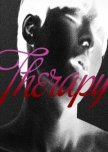This review may contain spoilers
A cerebral, symbolic, and emotionally complex BL—not your typical romance.
"Therapy" is a bold and unconventional short series that brings both sexual and psychological tension to the table—for both the actors and the audience. Every detail in this series feels deliberate and precise. Although I wasn’t able to watch it with English subtitles, I personally translated every line, pausing throughout to understand the dialogue and context fully.
From the very first episode, the director establishes that the relationship between the two characters is strictly transactional. This is made clear through the therapist’s precise actions, starting with the signing of the contract. His emotional detachment is evident and consistent, setting a professional tone. This is not your typical "boy’s love" series—there is little to no emotional reciprocity between the leads, at least in the traditional romantic sense.
One of the standout aspects of the series is the use of color symbolism in the room settings, each reflecting the evolving emotional and psychological undertones of their interactions:
Black Room: Symbolizes raw desire. The sexual encounter here seems to exist solely to fulfill the client’s physical urges.
White Room: Represents clinical detachment. The interaction is mechanical, emphasizing the "therapy" aspect of the relationship.
Purple/Pink Room: Signals a shift. The client begins to desire not just physical intimacy, but also an emotional and romantic connection with the therapist.
Interestingly, it’s not the first three sessions that provoke the most sexual tension—but the last one. Despite the emotionally detached performances, the final session brings a layered complexity that is both arousing and unsettling.
Overall, "Therapy" stands out for its graphic storytelling, psychological themes, and unique visual direction. It’s a series that warrants deeper analysis and discussion, especially when it comes to the director’s intent and the emotional ambiguity portrayed. If you're looking for a BL that is more cerebral than romantic—and are open to dark, symbolic, and emotionally complex narratives—this is definitely one to watch.
From the very first episode, the director establishes that the relationship between the two characters is strictly transactional. This is made clear through the therapist’s precise actions, starting with the signing of the contract. His emotional detachment is evident and consistent, setting a professional tone. This is not your typical "boy’s love" series—there is little to no emotional reciprocity between the leads, at least in the traditional romantic sense.
One of the standout aspects of the series is the use of color symbolism in the room settings, each reflecting the evolving emotional and psychological undertones of their interactions:
Black Room: Symbolizes raw desire. The sexual encounter here seems to exist solely to fulfill the client’s physical urges.
White Room: Represents clinical detachment. The interaction is mechanical, emphasizing the "therapy" aspect of the relationship.
Purple/Pink Room: Signals a shift. The client begins to desire not just physical intimacy, but also an emotional and romantic connection with the therapist.
Interestingly, it’s not the first three sessions that provoke the most sexual tension—but the last one. Despite the emotionally detached performances, the final session brings a layered complexity that is both arousing and unsettling.
Overall, "Therapy" stands out for its graphic storytelling, psychological themes, and unique visual direction. It’s a series that warrants deeper analysis and discussion, especially when it comes to the director’s intent and the emotional ambiguity portrayed. If you're looking for a BL that is more cerebral than romantic—and are open to dark, symbolic, and emotionally complex narratives—this is definitely one to watch.
Was this review helpful to you?



